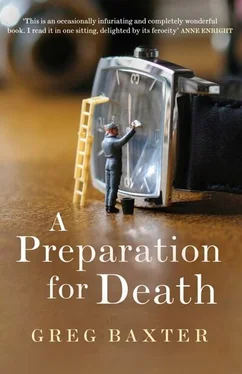The first time I slept in this room, I was fifteen years old. I was in Austria for a few weeks with my grandmother, Maria. Sometimes, without provocation, the image of my first night in Vienna springs back to life in daydreams: the picture of Erika — Herbert’s sister — leading me down the short corridor, speaking in a voice so high-pitched that it plays again in my head like some alarm ringing over a street in panic, referring to the room as my chamber — possibly because she wanted to present me with some Austrian elegance, choosing Kammer over Zimmer . I have not seen the room for eighteen years, and although it was not a sacrosanct place before I returned to it, somehow it is now, and I feel as though I have disturbed the grave of a peaceful memory.
The apartment used to belong to Erika, but she lives in a nursing home near Schönbrunn now. The day after I arrived, she had an accident that knocked all her teeth out — only two of them were real, but she cannot get new dentures immediately — so she is too depressed to see anyone outside immediate family. Which is a pity, because I’d hoped to talk to her about her memories of Herbert.
Walter has made the old place about as modern as anyone could without knocking down walls or replacing shelves and appliances. He has repainted all the rooms — all but mine — in bold, bright colours. He has also reorganized the space somewhat. The dining room is now a sitting room — and this has created an unexpected intimacy, a place for long conversations — and the sitting room is now a dining room with a small space set aside for meditation and reading, a comfortable chair surrounded by lots and lots of plants.
The apartment is on the top floor of the building, and Walter’s parents — Dieter and Heidi — live in the apartment below. On the ground floor is unused office space. Below that is a basement with a room for big dinners, a storage room — which was, at one time, Walter’s bedroom — and a utility room with a washing machine.
I have six weeks to do nothing in Vienna. Walter is exhausted from December celebrations, and works from three p.m. to five a.m. most days; he’s a waiter, and he’s just changed jobs. He leaves restaurants much as fickle people leave lovers: the first short while he is overjoyed; then the fighting begins; then he storms out. He seems unable to bear a life without drama — he is gay, yet falls only for heterosexual men — but the drama weighs on him heavily. Every year, usually in October and November, he has a nervous breakdown. He didn’t have one this year, and his parents think it’s because he kept himself busy renovating his new space.
I travel into town with Walter, we have a beer or coffee, then he goes to work. After that, I go for long walks around the First District to reorient myself. I pause to admire the architecture, even when it is not exceptional. I walk with my eyes up. In the evenings, I observe the city twinkling to life. I am keen to feel something awakening in me, some recognition of myself in Vienna. I visit bars and cafés I remember liking, but do not always enter; I only want to prove to myself that I know where they are. I follow crowds for a while, then abandon them. The last U4 leaves Karlsplatz at twelve-thirty a.m., but I always grow a little restless with solitude, or, rather, faintly out of sorts being seen to be on my own, and head home earlier. I listen to some of Walter’s classical CDs — which I’ve begun to copy onto my computer, so that I may transfer them to my iPod and play them while strolling through the city — and drink two bottles of wine, finish my pack of cigarettes, and fall asleep.
The amount of space the city inhabits in my mind is totally out of proportion to the time I have spent in it. I came for a few weeks in 1990, but travelled a good deal elsewhere in Austria. When I lived in Germany, in 1994 and 1995, I came to visit three or four times, but never for more than a handful of days. In 2002, I spent one month here. In 2005, a week; in March 2008, five days. That is all — no more than three months altogether. But when anyone asks, I tell them I have lived here an incontiguous year, at least.
I was once very close to fluency in German — so close I could fake fluency — and the language comes back to life in me, slowly. I have already had long conversations with Walter, and separately with Dieter and Heidi, and on the telephone with a friend, Christl. Talking stirs the language out of dormancy — there is no other way for me to remember it. I begin a sentence like a man jumping from an airplane without checking his parachute. I arrive at the spot for the word, and suddenly, the word has come out of my mouth, and the sentence drifts coherently to the ground. Or the word does not come, and I must approach the subject from another direction. German words storm my inner English monologues — mühsam, leider, leisten, unerträglich, Ausnahmen, undsoweiter. In the beginning , I might say, when I speak to Clare on the phone, because my brain is getting used to starting sentences with Am Anfang .
I like to memorize interesting words from books I really ought to be reading in English. This time I have brought along Wittgenstein’s Philosophische Untersuchungen . I jot down nice words in a large spiral notebook I brought from Ireland — this morning it was irreleitend (misleading) — and spend the day inventing contexts to use them in. The first time someone hears a foreigner with bad German use vorführen correctly in a sentence, they are astounded; the fifth time in an hour, they grow suspicious. All this means I am confounding people with advanced speech, or idiom, or accent, one minute, and idiotic mistakes, or baffled simplicity, the next. The other night, Walter asked me to explain some of Wittgenstein’s concepts. I handled this with some fluency. But when he asked me what I did on New Year’s Eve — he had to work, so I spent the night with family friends — I was stumped. I simply said it was lovely ( genial ) but extremely cold ( abarschkalt ) — we spent the night drinking on the street, listening to music at various points around the inner city — and that I was tired and had a headache. I have no flexibility in German; I lack the capacity, so far, to rearrange what I know into something that is individual, original. I think this must be exactly how a small child approaches language: when he imitates, he succeeds, but he cannot express himself through imitation; he wears the language like ill-fitting clothes.
This morning — Saturday, January 3rd — I was awoken by the sound of something scraping the street. People who are used to cold climates will think I am an idiot for not knowing immediately what this was. It had a burping diesel engine, and it came down the road slowly, twice. On the first occasion, it woke me, and I checked my phone for the time: it was not yet six. The sky was still dark, and the light in the street was blue — above the front door of our building there is a blue, illuminated sign for the office that is no longer open. I tried to go back to sleep. About half an hour later, the sound returned. It was extremely loud. I turned my light on and picked up Wittgenstein, but I was too tired to make the effort. The noise became so potent, so close, that I got up to investigate. I opened the curtains and looked out: the street was still glowing blue, and the sky was dark, but I could see that it had snowed during the night. The rooftops across the street were white, and the plants on the window sills, and all the parked cars. I stepped onto the balcony. I had nothing on but boxers and a T-shirt. I tiptoed: the stone surface was like ice. I leaned over the edge and saw that the vehicle — a snow plough — had cleared a narrow black path down the middle of the street.
Читать дальше












